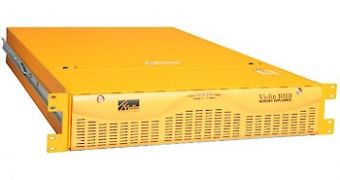The solid state drive industry is growing significantly with each passing day, and, consequently, we are seeing better, more advanced and faster solutions being released on the market. The latest in the world of SSD storage comes from Violin Memory, a provider of the world's fastest and most scalable memory appliances, which has recently announced the availability of the Single Level Cell (SLC) NAND Flash Modules for its Violin 1010 Memory Appliance. The new high-end storage solution is made entirely of SSDs, and is aimed at I/O-intensive jobs, such as relational databases and Web appliances.
"Flash will be a major solution to lowering the cost of Internet-scale applications and reducing power requirements of the data center,” said Donpaul Stephens, Founder and President of Violin. “We are delighted with the interest being shown by NASDAQ 100 companies in our Flash products and technology."
The company's Violin 1010 has been designed to support a maximum of 4TB of SLC Flash capacity, capable of replacing more than 500 hard disk drives, running at a high-speed of 15K RPM, normally used for applications such as Oracle, MySQL and Objectivity databases. The Violin 1010 offers 100K write IOPS and 200K read IOPS, while keeping the cost and power per operation to 80% lower than performance disk solutions. At the same time, it also provided a 95% lower latency, to dramatically improve response times of individual queries.
Furthermore, the company's Flash RAID technology, specifically designed to improve NAND Flash system performance, can deliver full RAID data protection and efficiently enhance the performance. It enables 60% more useable capacity and bandwidth, compared with inefficient RAID 1 solutions.
Gene Ruth, storage analyst for The Burton Group, said that Violin Memory's solution was uncommon to the SSD market, as the company managed to offer a radical new form factor, as opposed to the "traditional hard disk look-a-like implementations of SSDs. The memory appliance form factor allows companies to have highly scalable, high performing, and extremely power efficient flash memory storage systems. A flash memory appliance serves especially well as the foundation of a dedicated Tier-Ø infrastructure."

 14 DAY TRIAL //
14 DAY TRIAL //